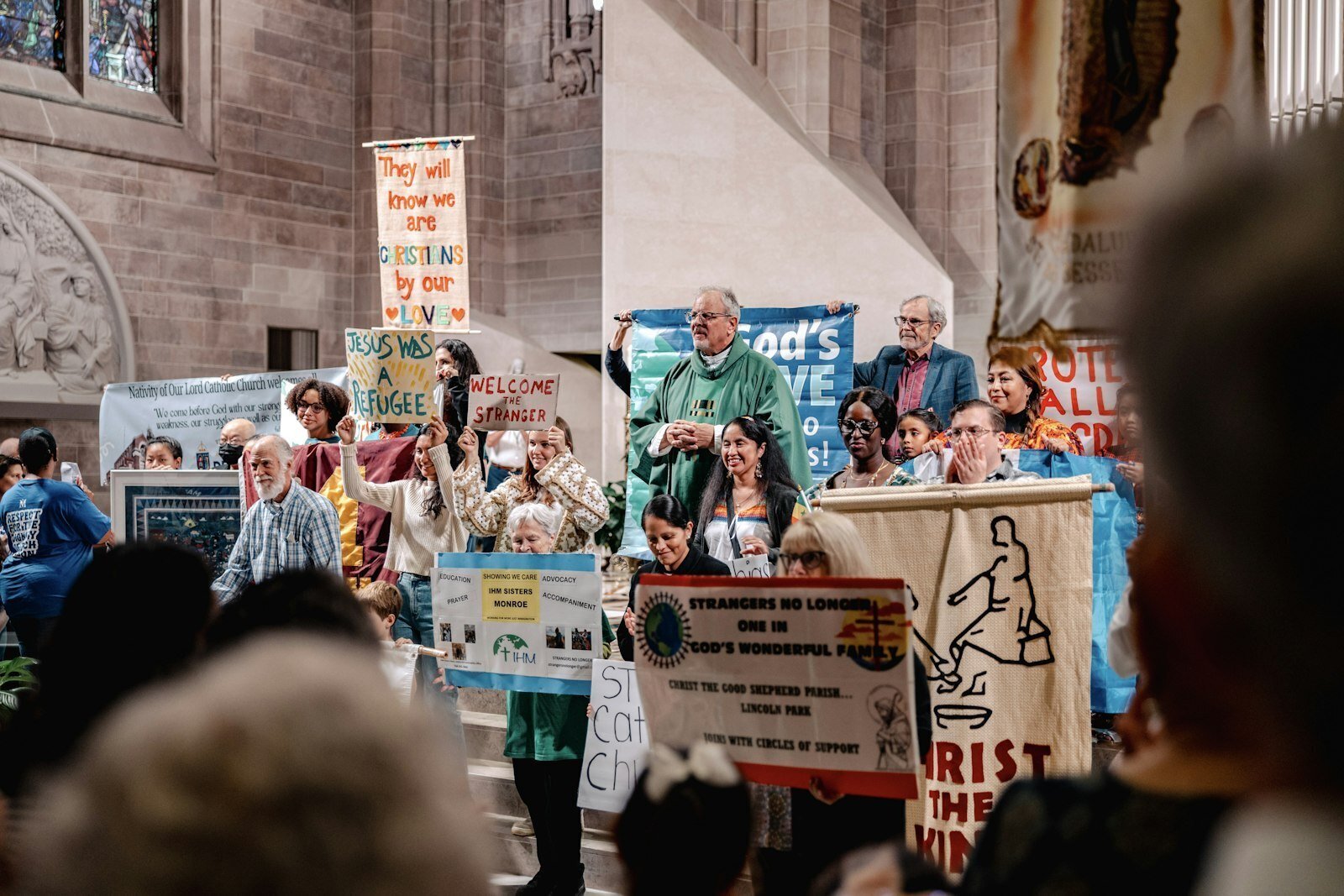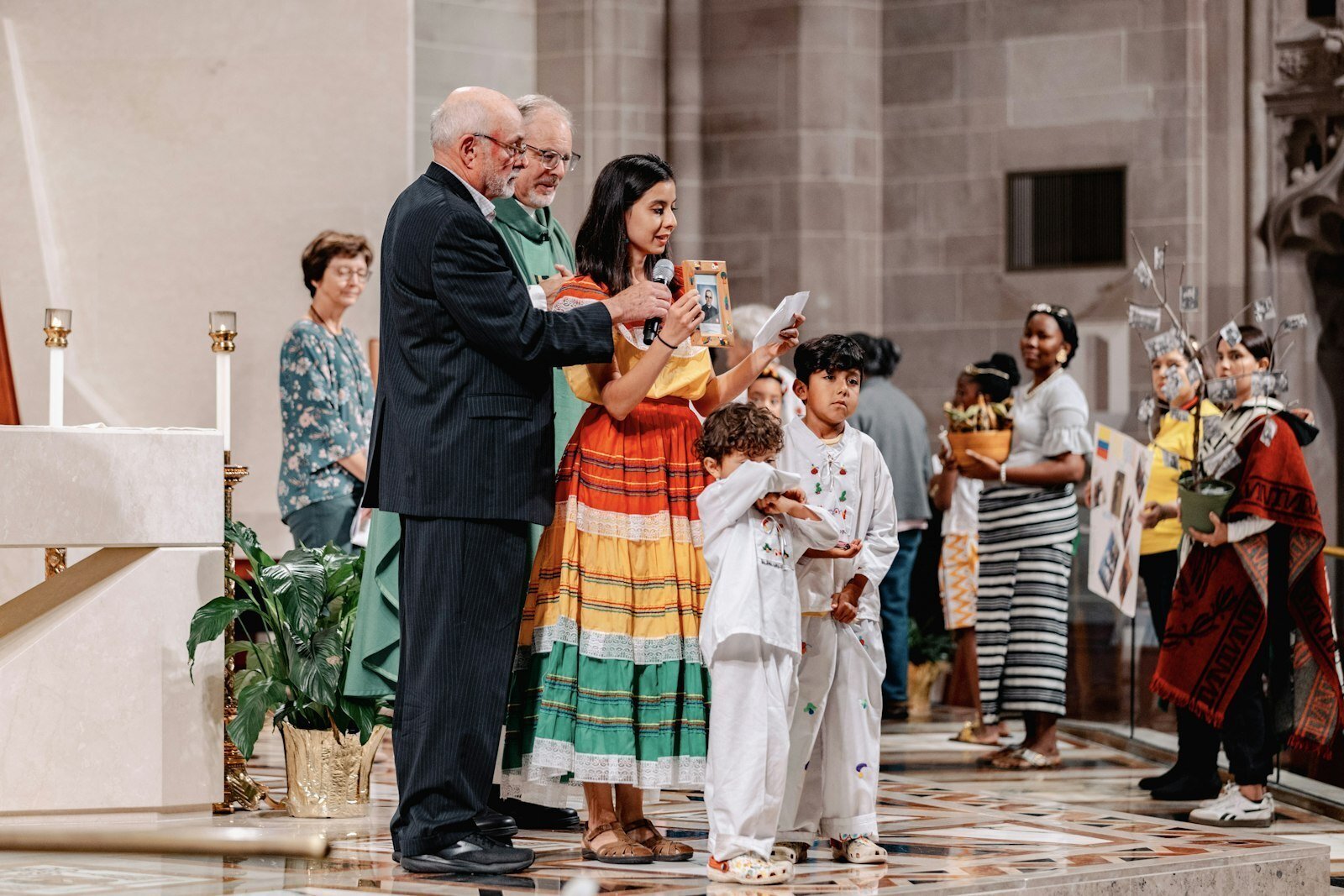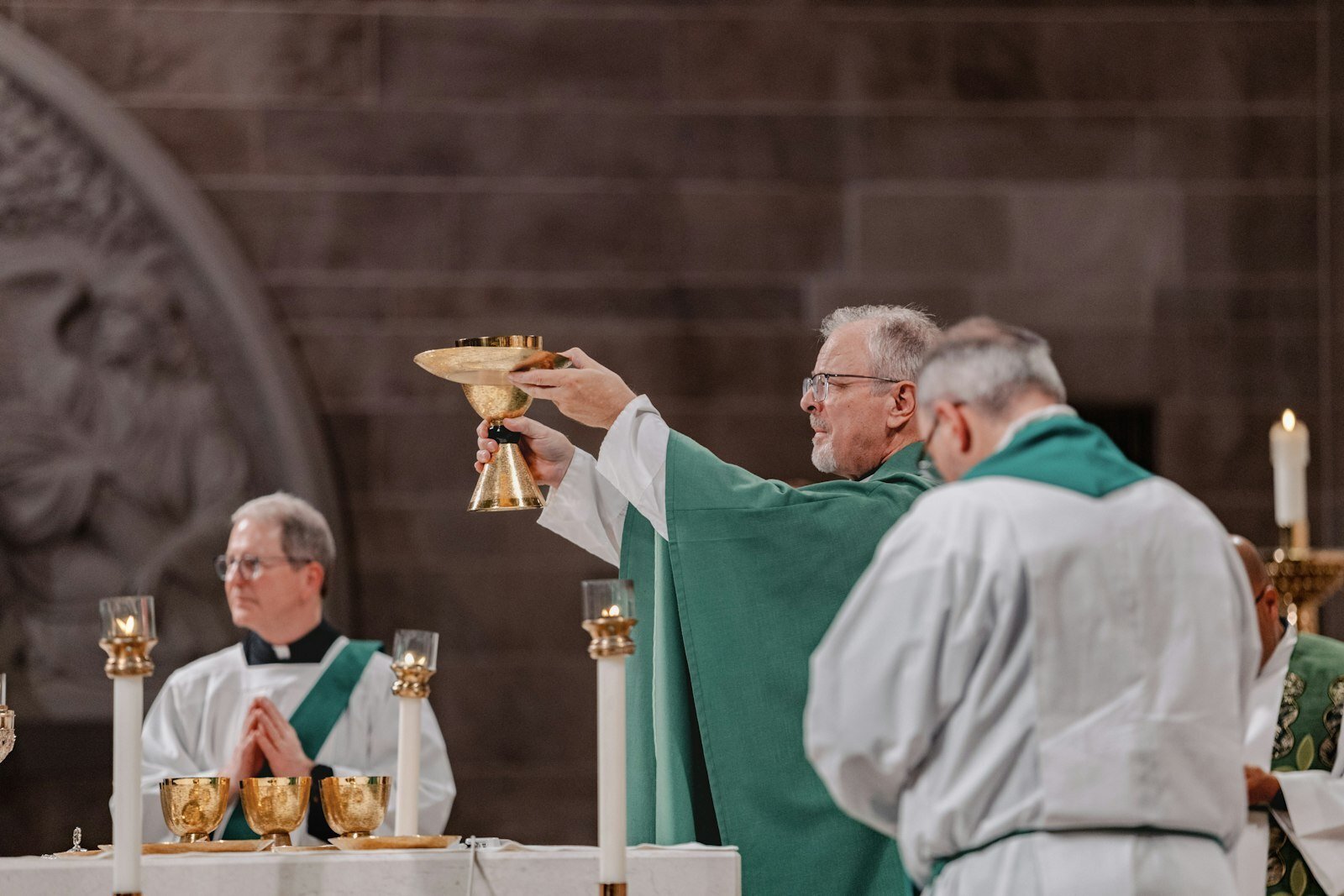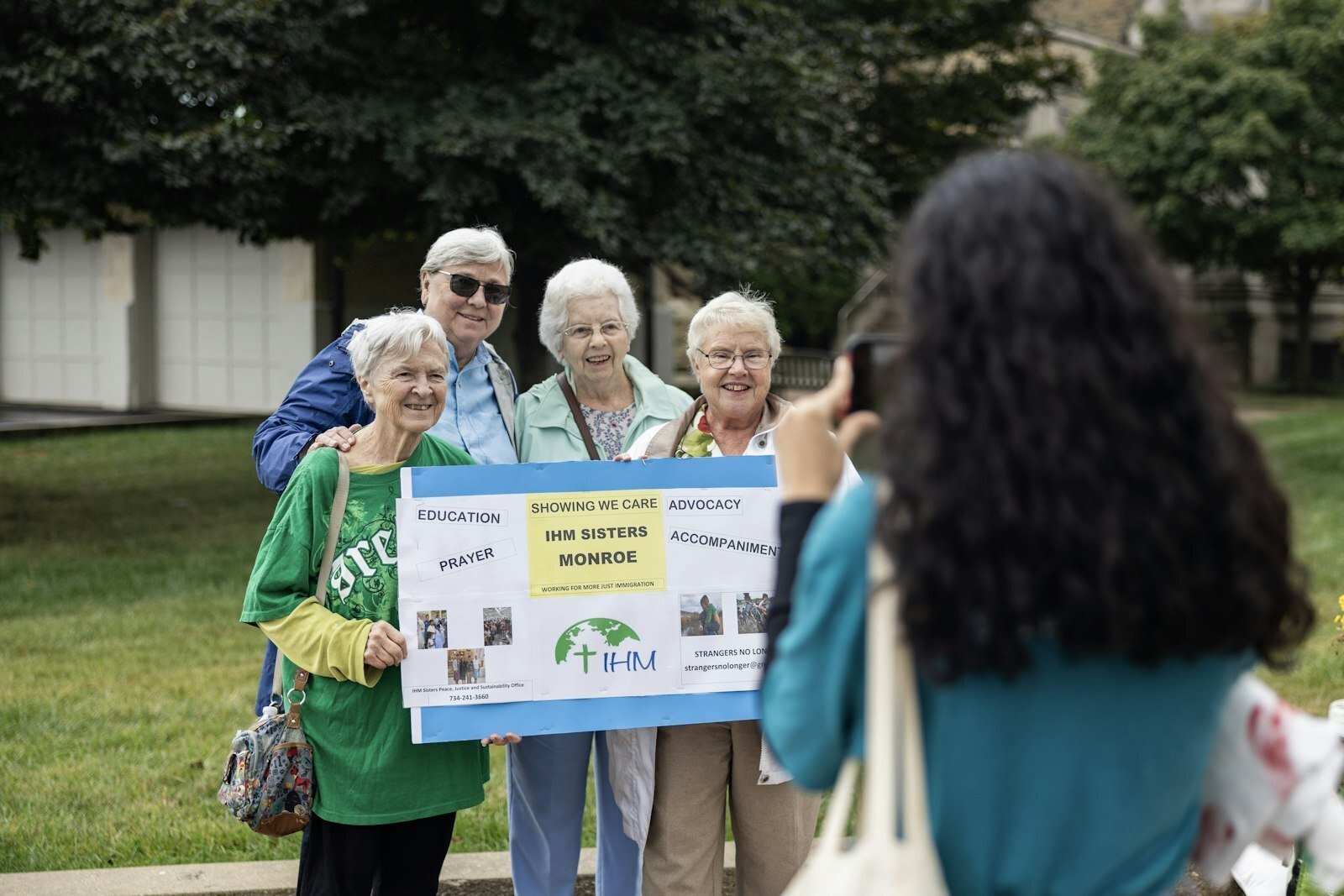Strangers No Longer hosts celebration for World Day of Migrants and Refugees; day of advocacy planned in Lansing on Nov. 12
DETROIT — The universality of the Catholic Church was on full display as people of various cultures robed in their traditional dress and young people carrying banners calling for immigration reform gathered near the altar at the Cathedral of the Most Blessed Sacrament.
Young and old, immigrants and native-born, representing cultures that span five continents, stood near the altar Sept. 29, surrounding Fr. David Buersmeyer, the celebrant for the 110th World Day of Migrants and Refugees Mass.
The group had just finished a procession around the cathedral to signify the local Church’s solidarity with immigrants and refugees, and Fr. Buersmeyer asked the people gathered at Detroit’s mother church to see how Christ brings people of all backgrounds to the table.
“Let’s take a moment before we begin to look at this diversity,” Fr. Buersmeyer said. “If we were to ask everyone gathered, ‘Where did your ancestors come from?’ hundreds of counties would be named. But all of that comes together here, around the altar of the Lord, where all of that becomes something that builds up each other rather than tears us down.”
Strangers No Longer, a network of Catholics in Michigan that formed in 2017 to build “Circles of Support” in parishes throughout the state to assist immigrant communities and advocate for immigration reform, organized the Mass.

Fr. Buersmeyer, chaplain for Strangers No Longer, reflected on the liturgy’s Gospel from St. Mark, in which Jesus rebukes his disciples when they call to his attention that a person is healing people in Jesus’ name but was not among the chosen disciples.
Fr. Buersmeyer said throughout the Gospel, Jesus gets most annoyed when people display a sense of self-righteousness and fail to see the good in others.
“Jesus gets upset when he deals with self-righteous people who think they don’t need God’s mercy, or they have everything in order, but they look at others and say, ‘They are doing wrong,’” Fr. Buersmeyer said. “Let’s take a moment to think about where we mess up in not allowing God’s goodness to shine forth. Where do we get it wrong and creep a little bit of self-righteousness?”
Jesus assures his apostles that anyone who is working in the name of Christ is doing the Father’s will, rebuking the apostles for failing to see God working through others.
Fr. Buersmeyer said when communities fail to welcome and celebrate the gifts migrants and refugees bring to the community, they fall away from building the kingdom of God.
“Quite often we get sidetracked because we don’t celebrate the good in every person, we don’t see God’s presence in every person,” Fr. Buersmeyer said. “And when we begin to separate, we begin to justify ourselves, we fail to see the good and view others as not deserving the good. We end up messing up the world for God, and we create havoc in the world.”
The liturgy was a celebration of all the good different cultures have brought to the world and God’s church.

Music was provided by the Sacred Heart Parish Choral Ensemble, the Ugandan Catholic Community of Michigan Choir, and a combined group comprised of the Basilica of Ste. Anne's Spanish Choir, the St. Gabriel Marimba Ensemble and Cristo Rey Parish in Lansing.
The Mass' first reading was in Creole, and the second reading was in Vietnamese, while the prayers of the faithful were in Polish, Tagalog, Vietnamese, Hmong, French, Luganda, Italian and Gaelic.
During the Our Father, Fr. Buersmeyer encouraged the faithful to pray aloud in their native language.
Bill O’Brien, executive director of Strangers No Longer, said every element of the liturgy and the preceding procession was meant to show that immigrant and migrant communities are “seen” in the Church.
“The first focus of today was the desire of immigrants to not be invisible because of the relationships immigrants have in our Church, and the non-immigrants responded and said, 'We don’t want you to be invisible either,'” O’Brien told Detroit Catholic. “Therefore, let’s have a liturgy where we all come together, immigrants and non-immigrants, immigrants from different continents, and we celebrate together.”
O’Brien was particularly moved during the offertory when men and women representing various immigrant communities in Metro Detroit presented gifts from their home cultures and expressed both pride in their roots, anguish in leaving, gratitude for finding a new home and faith in God who watches over all.
“When the men and women were bringing up symbols of the offertory, they each talked about the different aspects of their pain and their hope,” O’Brien said. “They spoke about their pain of being away from family, and their home country, or hope and gratitude, and I was moved to tears.”
Fr. Stan Ulman of St. Mary of the Hills Parish in Rochester Hills said the liturgy was a beautiful display of the universal Church, coming from various corners of the world to meet at the Holy Sacrament, to meet at Christ.

“The Eucharist is what brings us together; it is a sign of God’s love for us and Jesus’ sacrifice for all of us and a gift we are allowed to share with one another,” Fr. Ulman said. “When they were bringing up the gifts at the offertory, all the nations that were represented, some from war-torn areas, others that were very poor, but they were all here to give devotion to God.”
This year’s World Day of Migrants and Refugees comes as the United States approaches an election year in which immigration policy is a major point of contention. The year 2024 has seen an increase in migration activity at the U.S-Mexico border and charged rhetoric about immigrants coming into the United States.
O’Brien said Strangers No Longer's work, from organizing information sessions at parishes about immigration policy to highlighting immigrant and migrant communities in parishes where they were previously unnoticed, allows parishioners of every political stripe to gain a better understanding of the issues and humanize the topic.
“The Church, the parish, that’s where we all come together, whoever you are going to vote for,” O’Brien said. “The parish, in Catholic life, pushes people to pray about this. To go deep, to talk to God and really look at their conscience. But here, we can have a community of people who vote differently. We don’t throw stones at each other in church. We are a people called to be a community who really take their conscience and relationship with God seriously.”
Organizers spoke after Mass about ways in which they can support immigrant and migrant communities in parishes across the state, including a Strangers No Longer-sponsored day of action. The group will travel to Lansing on Tuesday, Nov. 12, during the “Lame Duck” session of the legislature after the Nov. 5 election to advocate for “Drive Safe” bills, which would allow immigrants, regardless of legal status, to apply for driver’s licenses and state IDs.

The event will allow parishioners to meet with state representatives and senators to lobby on behalf the bills to restore access to driver’s licenses that immigrants had in Michigan before 2008.
“It’s a heartbreaking fact that in Michigan, over 100,000 men and women in our state, working on our farms and in our restaurants, in our hotels and manufacturing industry, cannot drive,” said Rich Faba of Strangers No Longer. “Since 2008, they’re not allowed a driver’s license or state ID, because of their immigration status.”
Faba said the bills, which receive the support from the Michigan Catholic Conference, will allow immigrants to apply and qualify for a driver’s license to ensure they are safe drivers. The IDs will also make it easier for the children of immigrants to go to school and for immigrants to buy necessary prescriptions at the pharmacy where ID is usually required.
“These bills will allow a driver to get a driver’s license or state ID in Michigan without proof of citizenship, just like before 2008,” Faba said. “Eighteen other states also allow this. Will you join us in Lansing on Nov. 12? We will make it easy for you, and we will have buses and lunch in Lansing. If there was a time to dip your toe in being an advocate in the waters of social justice, this is it.”
Beyond advocacy, pastors and organizers at the Mass hope people will take away how much richer the local Church is because of the presence of immigrants and refugees in their parishes.
“I hope people got a taste of the universality of the Church; I hope they got to see the variety of people in our Metro Detroit area,” Fr. Ulman said. “Part of the problem with refugees is they are unseen, they are put to the sidelines and people don’t take them seriously. Tonight was about making sure they are seen, they welcomed, they are loved as children of God.”
Copy Permalink
Immigration and refugees












